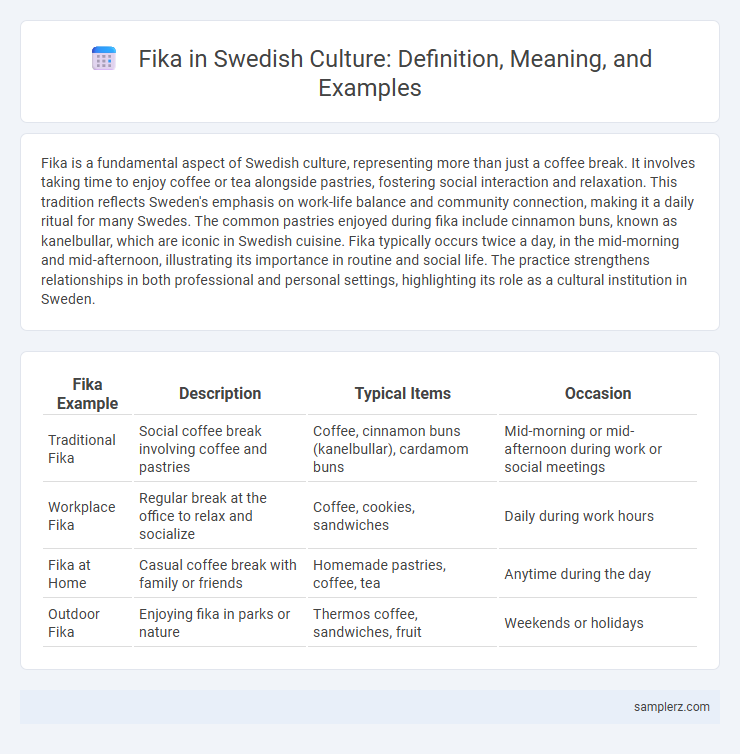Fika is a fundamental aspect of Swedish culture, representing more than just a coffee break. It involves taking time to enjoy coffee or tea alongside pastries, fostering social interaction and relaxation. This tradition reflects Sweden's emphasis on work-life balance and community connection, making it a daily ritual for many Swedes. The common pastries enjoyed during fika include cinnamon buns, known as kanelbullar, which are iconic in Swedish cuisine. Fika typically occurs twice a day, in the mid-morning and mid-afternoon, illustrating its importance in routine and social life. The practice strengthens relationships in both professional and personal settings, highlighting its role as a cultural institution in Sweden.
Table of Comparison
| Fika Example | Description | Typical Items | Occasion |
|---|---|---|---|
| Traditional Fika | Social coffee break involving coffee and pastries | Coffee, cinnamon buns (kanelbullar), cardamom buns | Mid-morning or mid-afternoon during work or social meetings |
| Workplace Fika | Regular break at the office to relax and socialize | Coffee, cookies, sandwiches | Daily during work hours |
| Fika at Home | Casual coffee break with family or friends | Homemade pastries, coffee, tea | Anytime during the day |
| Outdoor Fika | Enjoying fika in parks or nature | Thermos coffee, sandwiches, fruit | Weekends or holidays |
Understanding Fika: Sweden’s Beloved Coffee Break
Fika, a cherished Swedish tradition, revolves around taking a pause to enjoy coffee accompanied by pastries like cinnamon buns, fostering social connections and relaxation. This cultural ritual emphasizes mindfulness and the importance of slowing down in daily life, often shared with friends, family, or colleagues. Recognized as a symbol of Swedish hygge, fika strengthens community bonds and promotes mental well-being through deliberate moments of togetherness.
The Historical Origins of Fika
Fika, a cherished Swedish tradition, originated in the early 18th century as a moment for coffee breaks that emphasized social connection and relaxation. Historical records trace fika's roots to the introduction of coffee in Sweden during the 1700s, where it evolved into a cultural ritual symbolizing hospitality and community. This practice reflects deeper Swedish values of balance, well-being, and togetherness embedded throughout history.
Typical Fika Foods and Beverages
Typical fika foods in Swedish culture include cinnamon buns (kanelbullar), cardamom bread, and almond cake, all of which pair perfectly with coffee. The beverage of choice is usually a strong, black coffee called "kaffe," often complemented by tea or juice for variety. These foods and drinks create a cozy, social atmosphere that defines the traditional Swedish fika experience.
Fika Etiquette: How Swedes Do It
Fika in Swedish culture represents more than just a coffee break; it embodies a social ritual emphasizing connection and relaxation. Swedes practice fika by pausing daily to enjoy coffee accompanied by pastries, often cinnamon buns, in a calm, unhurried manner with colleagues or friends. Politeness during fika includes waiting for everyone to be served before starting, engaging in light conversation, and respecting the quiet, cozy atmosphere essential to the tradition.
Fika in the Modern Swedish Workplace
Fika in the modern Swedish workplace fosters social connection and productivity by encouraging employees to take regular breaks for coffee and pastries, promoting informal communication and relaxation. This cultural practice is embedded in organizational routines, reflecting Sweden's emphasis on work-life balance and collective wellbeing. Companies often design spaces specifically for fika, highlighting its role in enhancing collaboration and job satisfaction.
Fika Traditions in Swedish Homes
Fika traditions in Swedish homes emphasize taking regular coffee breaks to foster social connections and relaxation. Families often gather around a shared table to enjoy coffee paired with pastries like cinnamon buns, reinforcing a sense of community and cultural identity. This daily ritual reflects the Swedish value of balancing work and personal life through intentional moments of pause.
Fika with Friends: Social Bonding over Coffee
Fika in Swedish culture serves as a cherished social ritual where friends gather to share coffee and pastries, strengthening personal bonds and fostering community spirit. This tradition transcends mere coffee breaks, emphasizing meaningful conversations and relaxation in a cozy atmosphere. Engaging in fika with friends enhances social cohesion and reflects Sweden's emphasis on work-life balance and interpersonal connection.
Celebrating Seasonal Fika: Swedish Holidays and Sweets
Seasonal fika in Swedish culture highlights traditional holidays with specific sweets like lussekatter during Lucia and pepparkakor for Christmas. These treats, combined with coffee or tea, create a warm atmosphere that strengthens social bonds and honors cultural heritage. Celebrating seasonal fika reflects Sweden's deep appreciation for ritual, community, and culinary traditions tied to the changing calendar.
Fika Cafés: Where to Experience Authentic Fika
Fika cafes in Sweden offer an authentic experience of this cherished cultural tradition, featuring cozy atmospheres and a rich selection of freshly brewed coffee paired with traditional pastries like cinnamon buns. Popular spots such as Vete-Katten in Stockholm and Cafe Saturnus in Goteborg provide locals and tourists alike with a true taste of Swedish fika, emphasizing slow living and social connection. These cafes serve as communal hubs where the essence of Swedish hospitality and the ritual of taking meaningful coffee breaks come alive.
Fika’s Influence on Swedish Work-Life Balance
Fika, the traditional Swedish coffee break, plays a crucial role in promoting work-life balance by encouraging regular pauses for social interaction and relaxation during the workday. This cultural practice fosters a sense of community and reduces stress, enhancing overall employee well-being and productivity. Swedish companies often institutionalize fika breaks, reflecting the value placed on mental health and harmonious professional environments.

example of fika in Swedish culture Infographic
 samplerz.com
samplerz.com